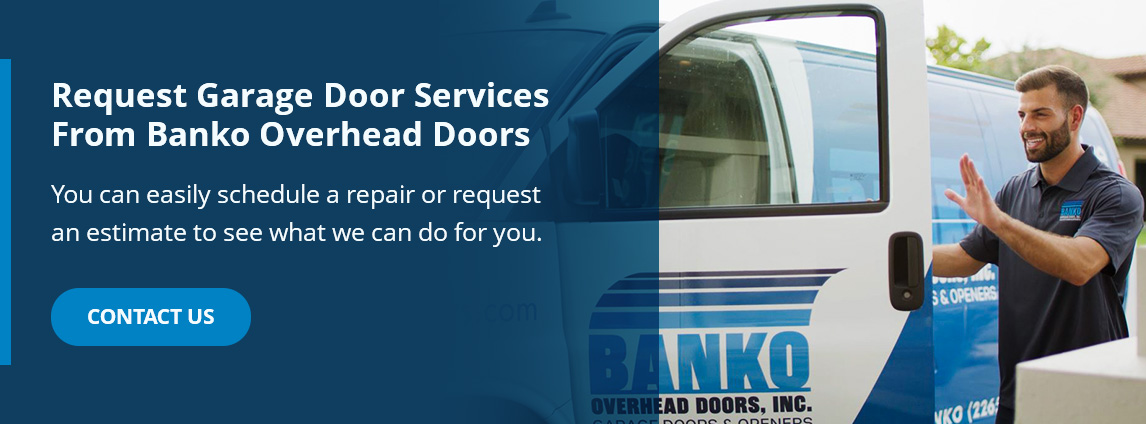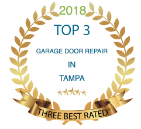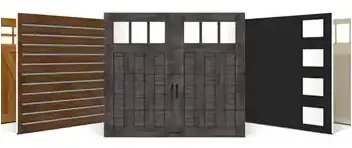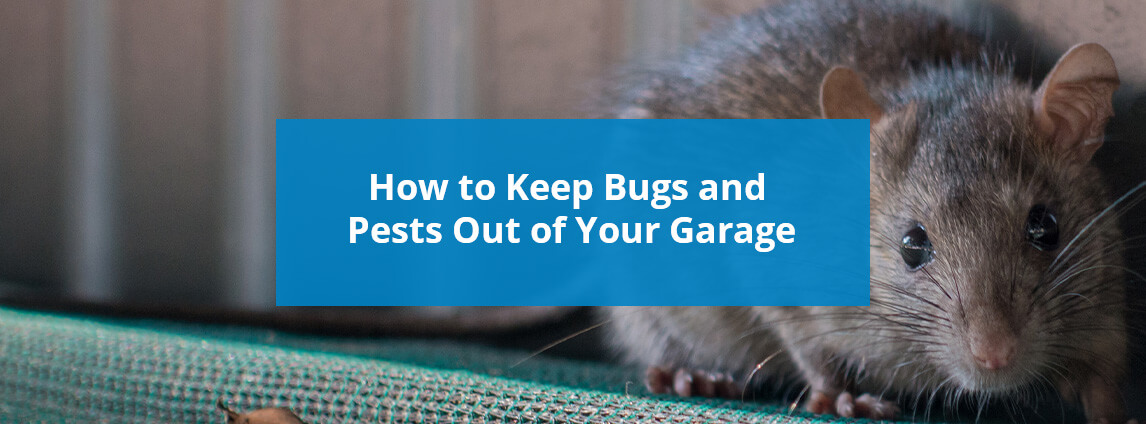
Your garage is an essential part of your home, but it can be vulnerable to invaders that wreak havoc on your property and impact its structural integrity. Insects and other pests find their way inside garages because they provide shelter from the elements. Thankfully, there are several ways to minimize a pest presence and keep your garage in the best shape possible.
From sealing entry points to eliminating attractants and thoroughly cleaning, a combination of simple yet effective methods can safeguard your garage against unwelcome intruders. Use our comprehensive guide to discover practical tips and solutions for keeping bugs and pests at bay, creating a pest-free haven within your garage.
Table of Contents
- Types of Insects and Pests to Watch For
- Common Reasons Invaders Enter Your Garage
- How to Keep Bugs Out of the Garage
- How to Keep Pests Out of Your Garage
- Use Garage Door Maintenance and Installation to Keep Your Space Pest-Free
Types of Insects and Pests to Watch For
Knowing which insects or rodents are in your garage can help you determine the quickest way to get rid of them. Each of the following pests can cause several kinds of damage and inconvenience, which can impact your removal and protection methods. Here are some of the most common garage invaders.
- Crickets: Crickets enjoy garage spaces, especially when the weather gets dry and hot. In Florida, the weather can quickly steer crickets to your space because it offers cool protection from the outside. These critters can be bothersome for families by making loud noises, but they can also damage clothing and other fabrics when they jump around.
- Silverfish: These insects often enter your space by squeezing their bodies through tiny gaps. These stubborn bugs can wreak havoc on your garage by eating glue, paper, food and clothes. Female silverfish can lay eggs frequently, which can quickly cause an infestation.
- Flies: Nearly any area of your home can have a fly problem. These bugs like the scents that waft from garages, and they can easily enter the space when you open the door for use.
- Spiders: Scientists have identified thousands of spider species. Spiderwebs are one telltale sign that these creatures are making a home in your garage. Though spiders eat other pests like mosquitoes and flies, some species are poisonous, and any kind can make a mess of your things.
- Deer mice: Mice can carry diseases and damage your property. You might notice more mice in the cooler months as they start looking for warm, dry spaces.
- Sowbugs: These crustaceans enter garages to avoid the heat and seek moisture.
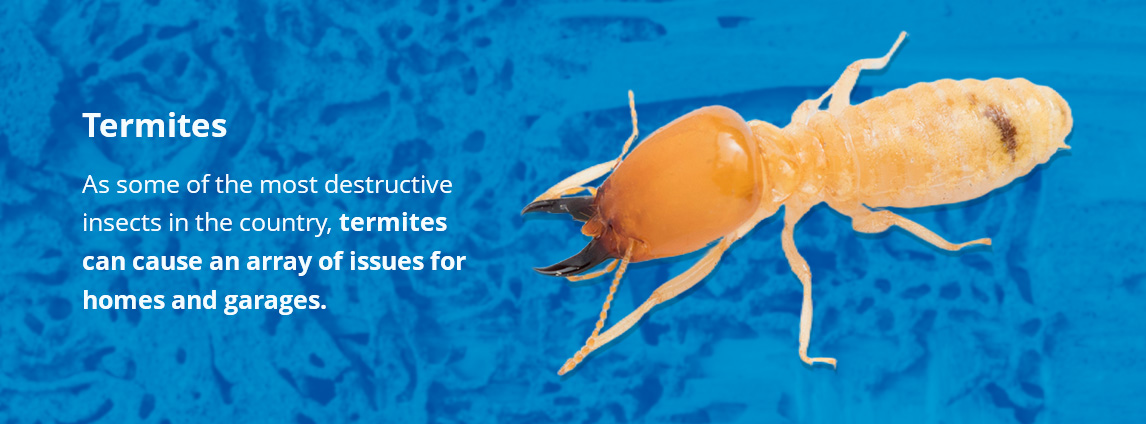
- Termites: As some of the most destructive insects in the country, termites can cause an array of issues for homes and garages. These insects consume wood but can also cause damage to furniture, fiberboard, paper and more.
- Ants: Three types of ants commonly make a home in garages — carpenter ants that nest inside structures, odorous house ants that burrow under debris and pavement ants that can mine into garage floors.
- Beetles: Beetles often sneak into your home by hitching a ride on firewood, potted plants and packages. Many beetles are harmless, but some species can destroy food products and damage plants, fabric and wood.
- Rodents: Rodents other than mice can also enter your garage. Squirrels, raccoons, moles and rabbits might seek refuge in your garage. You may even spot snakes and lizards looking for food while trying to avoid Florida’s extreme temperatures.
Common Reasons Invaders Enter Your Garage
Insects and other pests prefer dark, damp areas, and garages have plenty of these cozy nooks to reside in. Typically, these spots are challenging for humans to access, making them even better for garage invaders. Often, these pests will invade your baseboards, burrow into the floor or hide under piles of objects. Pests love these spaces for a few reasons.
- They offer protection: Your garage is a shelter from extreme temperatures, rain and natural predators. Pets looking for a new home or safety can find comfort in your space.
- They smell good: From the sweet scent of food and plants to the unique odor of stored grains, birdseed or spillage, your garage has a host of smells that intrigue pests. Some insects even enjoy less pleasing scents like sweat and garbage, which may be common if you use your garage as a workspace.
- They simulate natural environments: Many pests find your garage comfortable because it is similar to where they live in the wild. Garages tend to be moist, warm and dark — the ideal location for various insects and rodents.
How to Keep Bugs Out of the Garage
Implementing proactive measures is crucial for maintaining a clean, bug-free garage. You can create an inhospitable environment and prevent infestations by tidying your space, sealing entry points and eliminating attractants. Use these tips to keep bugs out of your garage and safeguard your property against unwanted intruders.
1. Keep It Clean and Dry
Insects love dark, damp spaces that remind them of their natural environment. Your first step to a bug-free garage should be cleaning and drying any moisture or addressing problems like leaks. Remove debris, dispose of trash and eliminate clutter. Consider whether you should store items in your garage and determine the best way to keep them safe if you use your garage as storage space.
Sweep and mop the floor to eliminate any residue. If you have a garage pantry, refrigerator or chest freezer, secure food in airtight containers and throw out any spoiled or expired items.
Next, inspect damp patches and address the problem quickly. For example, if you discover a leak in your garage, request a repair service as soon as possible. If the source is easy to clean, like spilled liquid or old food, clean the area and dry the space with proper ventilation. You may need to open windows or use a fan to reduce the liquid and humidity.
Finally, take a few extra steps to secure any garbage you store in the garage. Do not leave any recyclable materials or trash in the open. Close garbage can lids and take full bins out for pickup. Never leave bags unsealed, and prevent overflows from bags or boxes.
2. Seal Cracks and Repair Holes
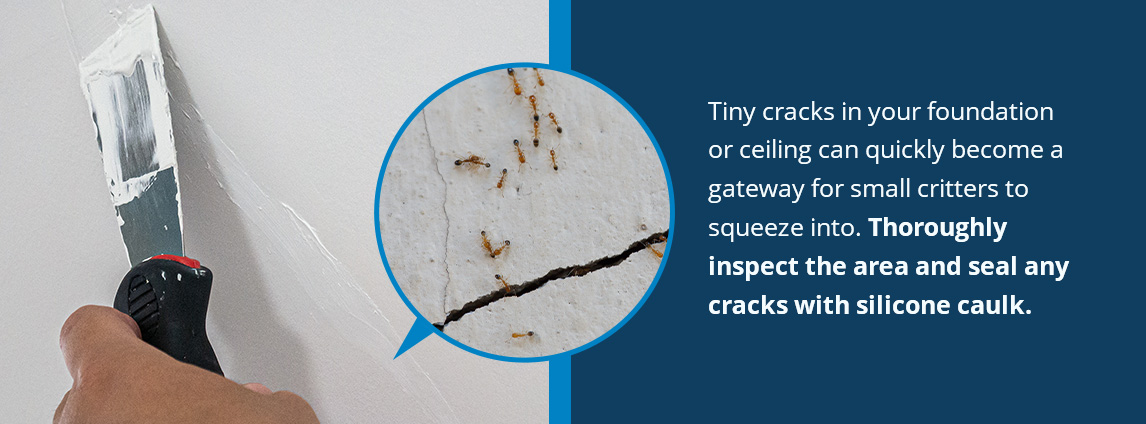
Tiny cracks in your foundation or ceiling can quickly become a gateway for small critters to squeeze into. Thoroughly inspect the area and seal any cracks with silicone caulk. Don’t forget to check your foundation, walls, ceiling and windows.
Holes in the walls and windows are like an open invitation for bugs. Evaluate corners and other sections that experience excess wear and tear. Check every part of your windows for damage, including the casing, panes and screens. Replace torn screens and patch holes quickly.
Use a ladder to address any damage to your ceiling. While checking for holes or small cracks, look for signs of leaks and repair them as soon as possible. Additionally, if you have an attic access door in your garage, clean and dry the space and discard unwanted items. Insects can find their way to these belongings as easily as those on your floor.
It may be time to consider a new door if you notice a lot of structural problems in your garage. An insulated door is ideal for those looking to reduce the presence of bugs and pests while saving money on your energy bills. These doors are easy to maintain, reduce outside noise pollution and keep pests away with weatherstripping and durable materials.
3. Spray the Baseboards
After cleaning, you can prevent insects from coming inside by spraying your baseboards with a reliable insecticide. Spray the inside and outside to kill bugs that try to creep into your space. Remember, insecticides are toxic and particularly dangerous for pets or young children. A nontoxic spray is safer, but may be less effective. Regardless of the type you choose, touch up periodically, especially after it rains.
4. Get Rid of Cardboard Boxes and Wood
Though you may have removed cardboard boxes during your initial cleanout, we cannot overemphasize the importance of this tip. Termites love organic materials, including wood and cardboard. Consider a different strategy if you usually store firewood in your garage or use cardboard boxes to organize. If termites find a home in either of these materials, they could soon eat through structural elements and essential objects. Consider storing wood outside, away from your home’s walls or foundation, and using airtight plastic storage containers.
5. Remove Spiderwebs
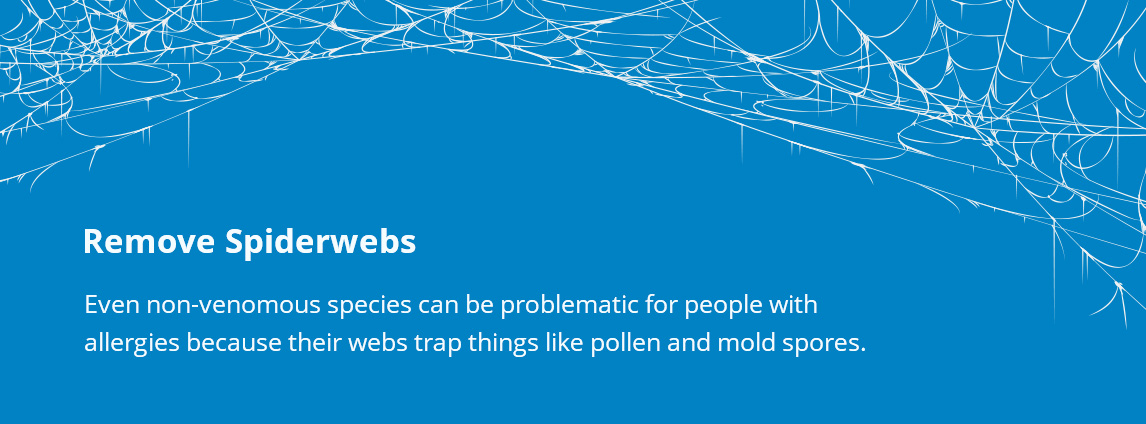
While spiders can reduce other insect populations, they can also be messy and destructive. Even non-venomous species can be problematic for people with allergies because their webs trap things like pollen and mold spores. Sweeping away spiderwebs can prompt these critters to make a home somewhere else. You will likely need to inspect for spiderwebs often, checking corners most frequently. This tip will also make your space cleaner and more visually appealing.
How to Keep Pests Out of Your Garage
Larger animals like rodents and snakes sometimes cause even more trouble than bugs. Though many preventive tips for insects can also help remove creatures such as rats, raccoons, moles and squirrels, you can also take the following steps.
1. Remove the Current Pests
Examine your garage for unwanted guests, checking behind shelves, near stored items, close to your ceiling and under any flooring. Look for warning signs like scratches, nesting piles, holes, animal carcasses or droppings. Use these to determine what species you’re dealing with, which will help you decide the best extermination or removal method. Take the necessary steps to eliminate the infestation, whether you hire a professional management team or use DIY methods.
2. Lay Some Traps
Humane traps can be a worthwhile investment if you choose to eliminate an animal infestation by yourself. Set out traps designed to safely capture wildlife without harming them. When you catch them, you can relocate them to a more suitable habitat away from your property. This approach prevents damage to your garage and belongings, minimizes potential health risks associated with wildlife infestations and promotes compassionate coexistence with local species. Additionally, timely trapping can deter animals from establishing nests or causing further disruptions in your garage, ultimately contributing to a harmonious living environment for humans and wildlife.
3. Use Weatherstripping
The gap at the bottom of your door is a prime entry spot for pests. Sometimes, this crack is too tiny to see, but it’s still crucial to close it. Rubber seals and weatherstripping materials can address this problem. Measure to determine the best size for your door. As an added benefit, these materials can prevent infestations, protect your space from flooding and make your garage more energy-efficient by closing off the space to the outdoors.
4. Protect Your Food
Food can attract all kinds of animals. Any food stored in your garage or remnants from cooking equipment like grills is like hanging out a welcome sign for pests. First, remove possible temptations. Throw away old products, sweep crumbs off the floor and seal items in airtight containers. If you store cooking equipment or utensils in your garage, wash and dry them after every use. Clear up residue and try to eliminate food smells before storage.
5. Use Plants and Essential Oils as Deterrents
Essential oils and plants are all-natural, nontoxic pest repellents. For example, many bugs and small animals detest the smell of peppermint, eucalyptus, lavender and cedar oil. These will discourage unwanted visitors from entering your space, mask existing pest-related odors and make your garage a more welcoming spot for leisure activities.
Use Garage Door Maintenance and Installation to Keep Your Space Pest-Free
The 10 tips above should help you create a cleaner, healthier garage with fewer unwanted visitors. However, you should also request routine maintenance checks for long-term assurance. Besides addressing possible pest-related concerns, preventive maintenance can extend your door’s life span and maximize your investment.
Professional repair services from a reliable provider like Banko Overhead Doors address various concerns and prevent minor problems from escalating into more severe, expensive issues. Work with your service provider to determine an ideal maintenance schedule that consists of regular cleaning, frequent inspections and tests for functions like door operation.
Additionally, consider a new garage door installation if you notice severe issues or your current door is reaching the end of its life. A new door can provide better insulation, a tighter seal and more durable materials, making it much more challenging for bugs and pests to find their way inside.
An insulated garage door is an excellent option if you’re browsing for reliable and effective models.
Request Garage Door Services From Banko Overhead Doors
A pest infestation signifies the need to get your garage door professionally serviced. Banko Overhead Doors has the experienced team and reliable knowledge base to help you take the best possible care of your garage door. Whether you need maintenance, repairs or new door installation, you can rely on us to deliver speedy replies and dependable service.
With more than three decades of industry experience, we know we can deliver the solutions you need to help your door look great and perform its best over the long term. We proudly serve West Central Florida with residential and commercial services, and our team is always ready to assist you in any way.
Protect your Florida garage by connecting with our team at Banko Overhead Doors. You can easily schedule a repair or request an estimate to see what we can do for you. We look forward to hearing from you!

